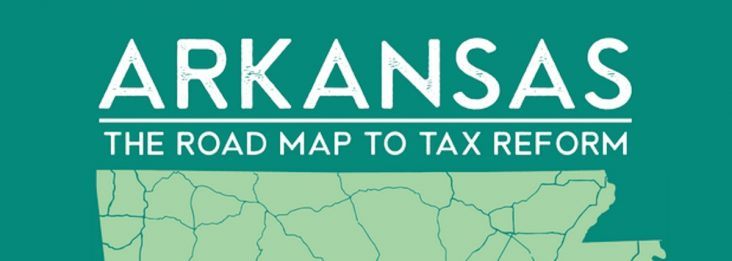Tax Foundation recommends Arkansas tax code overhaul, House Speaker Gillam says ready for reform
by November 14, 2016 2:03 pm 385 views

After the release of a university research report backed by the Washington, D.C.-based Tax Foundation, Arkansas House Speaker Jeremy Gillam said Monday (Nov. 14) he looks forward to addressing meaningful and responsible tax policy changes in the upcoming 2017 legislative session.
“Right now, we are already seeing a lot of enthusiasm among the membership of the House for this. I can’t speak for the Senate as to what their members are going to do, but as for the House we are of the mindset that we need to begin moving forward with reform,” said Gillam, R-Judsonia.
The Arkansas House leader made his comments at a State Capitol news conference unveiling a new 100-page report by the Tax Foundation and the Arkansas Center for Research in Economics (ACRE) at the University of Central Arkansas recommending various tax reform options for the state.
According to the report, “Arkansas: A Roadmap for Tax Reform,” many elements of the state’s tax system have not been overhauled since 1971. That has left Arkansas with a complicated and over burdensome tax code that stands in the way of economic growth and competitiveness with surrounding states.
“The last tax cut the state enacted two years ago moved things in the right direction, but the cuts were very targeted,” said Jeremy Horpedahl, an assistant professor of economics at the UCA. “Arkansas needs to consider more than just targeted measures, and instead it should enact a comprehensive tax plan that benefits all Arkansans. This (report) provides a number of ideas to help move us in that direction.”
Tax Foundation Economist Nicole Keading said the Washington, D.C.-based tax research group and UCA staff interviewed more than 100 individual and business taxpayers and policymakers in Arkansas over a period of six months and found that the state tax code is unfair, rates are too high and there was too much corporate welfare.
“During our months of travel across the state of Arkansas, Arkansans told us several key things affirming their desire for tax reform. Taxes are too complicated and too complex, and Arkansas is falling behind other states,” Kaeding said.
The key findings that emerged from the report include consensus that the individual and corporate income tax codes need to be reformed, and the state’s sales and use tax base needed to be “right-sized.” Kaeding said another surprising note that came out of the interviews with Arkansas taxpayers was widespread dislike of the “Texarkana exemption,” which frees Arkansas residents living in the border city from paying income taxes.
The report recommends first that policymakers broaden the tax base by reducing tax rates for individual income tax filers, making Arkansas more competitive with surrounding states. The three reform options include a flat tax rate of 4.95%; consolidation of the state’s three rate schedules into one with the top marginal rate at 5%; or a hybrid option with a higher marginal tax rate and a major income-tax cut for middle-income taxpayers.
Second, in reforming the state’s corporate tax code, the Tax Foundation-led report recommends reining in tax credits; improving treatment of net operating losses for Arkansas-based businesses by extending carryovers from five to 10 years; and lowering the corporate income tax rate and consolidating the number of brackets using a variety of options.
Lastly, the report said overhauling the state’s sales and use tax structure is a crucial element of fixing Arkansas’ overall tax system. According to the report, by combining the statewide 6.5% rate with a weighted average of local taxes, Arkansas has the third highest sales tax rate in the U.S., behind only Louisiana and Tennessee. The Tax Foundation says Arkansas lawmakers should consider broadening the sales tax base to more goods and services in order to lower the rate. Kaeding said Arkansas exempts too many consumer transactions, including groceries and gasoline. Lawmakers should also look at exempting purchases by business from sales taxes, where possible.
After the presentation of the new report, Gillam said he is eager to debate Gov. Asa’s Hutchinson new $50 million tax cut proposal and said he believes Democrats on the House Revenue and Tax Committee are also agreeable to reforming the tax code. Last week, Democrats maneuvered to win control of the influential House committee by stacking members on the panel to win a 11-9 majority. That control of Revenue and Tax could give the minority members some outside influence on Gov. Hutchinson’s desire for a $50 million tax cut in the 91st General Assembly, which begins in January.
“I’ve already had several members of the Democratic Caucus reach out over the weekend and express their desire to work with us on issues such as (tax reform),” Gillam said. “They said: ‘Look, we know that changes need to be made and we want to be helpful in that regard.’ So they are going to be supporters of what we wind up coming out of these discussions and figuring options we (choose).”
